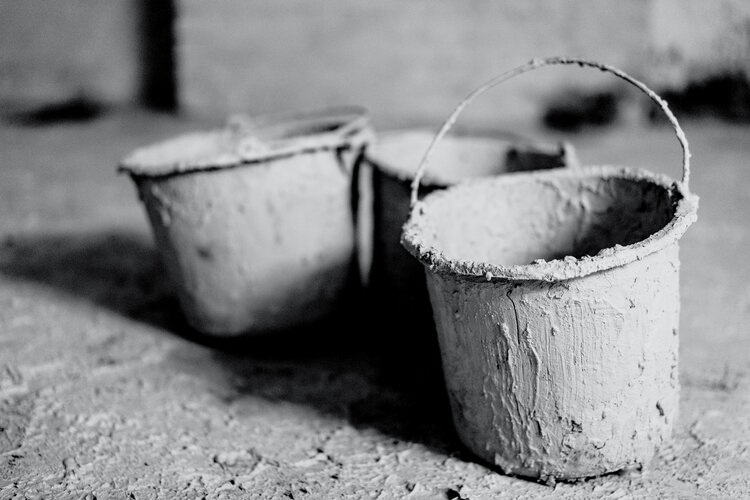
A few months ago, I had an email conversation with one of our college students in our church who asked me a question about something they were discussing in her philosophy class. I just stumbled back into that correspondance and I found it leaping off the page today. I was trying to answer her question and give her some food for thought, but the discussion is strangely appropriate to the situation we find ourselves in during this summer of 2020.
Specifically, it is the situation I find myself in today. There is a COVID-19 weariness and exhaustion, even depression that has fallen on many of us. Counties and states opened up during the Spring, which was great, only to find that many of those communities have already or may be backtracking in the next few weeks. Regular plans and vacation spots have become like the pitfalls on a board game, don’t get stuck there or you will lose a turn. We all feel like bootleggers if we cross state lines in some parts of the country. And besides the pandemic, the election season is already nauseating, sports teams are a mess, and the Fall school schedule is still a mystery. The media give us our daily (hourly really) reminder of the mess we find ourselves in. Constant reports of humans doing predictable human things, but it is all still an outrage depending on which side you are coming from.
There is a COVID-19 weariness and exhaustion, even depression that has fallen on many of us.
Anyways, her question was this, “In the medical field many people experience burn out. This burnout is often related to ‘Moral Distress.’ This is a sense of powerlessness where what one is instructed to do violates conscience. How should a Christian or an Existentialist respond to this and react?”
What a great college essay question! I rolled up my sleeves and went right into professor mode. I enjoyed writing the answer below. I add some new thoughts in parentheses…
“You suggest Burnout is often related to Moral Distress. While that may be the case, I wonder if that is the only source of burnout. Burnout, for me, has always been about not having a goal, or losing a sense of purpose. It’s not about hours worked or fatigue. When someone knows what they are working for, it’s hard to burnout. When you forget what you are working for or ignore what you are working for, that’s when you experience burnout.
An ancient Jewish Rabbi, Avot de Rabbi Natan, once said, “Do not be afraid of work that has no end.” This applies to non-profits ending water or food shortages, people trying to rescue women from abuse or sex-trafficking, groups dedicated to ending poverty or racism (and church work & ministry). Just because the work is endless, doesn’t mean we ignore it. Actually, be willing to jump into it even more. Don’t let the fact that it is endless deter you, feel privileged that you get to be in the fight to begin with.
“Do not be afraid of work that has no end.”
In the end, these problems will always be with us. Jesus says, “the poor you will always have with you.” He doesn’t say that so that we make light of their plight, but he wants you to make room in your life for other things. Work on the hard stuff, but at the same time… worship, play, love, read, raise kids, enjoy art, watch football (that’s mine and I am mortified that college football might not happen this fall).
Moral Distress may have a sense of control attached to it. If a physician honors the idea of the Hippocratic Oath, “first, do no harm,” they can hopefully handle the ups and downs. If do no harm turns into “It my job to save them,” that is where burnout can occur, not because of the work, but because of the wrong emphasis of purpose. I have learned and still learn… I am not God, and when I try I both fail and exhaust myself.
The violation of conscience may well be the violation of EGO. If I think I can save them, or must save them, or need to save them, it’s my job to save them… that’s where I will violate all kinds of things. But that was not my original calling. So for years, I worked in Hospice. It was a unique experience. Hospice basically asked people in the medical field to switch gears completely. We are no longer treating, we are providing comfort. We are allowing nature to take course. Sometimes, our conscience gets wrapped up in the ideas of how things should go. This child is dying. I don’t want the child to die. If the child dies, it’s not fair or it’s God’s fault. Maybe it’s my job to go against nature or to get mad at God. Distress can be the result of both.
(there have been a lot of emotions during this season, not liking or accepting what is happening, trying to fing ways to cheat it or defeat it…all of which can lead to distress).
Maybe Moral Distress is more about me violating the basic idea of “this is not the way things should be.” Faith tells us that all things are restored in the end. But there is a thing called Holy Discontent. Sometimes, we can’t wait for the end, we want them fixed now. If I do fix them, that must be handled carefully. I must make sure I am working on behalf of God, not impersonating him. Now, if I do not fix them, then I think it’s my fault or God’s fault. Neither of those ideas may be the case. But this could drive me to distress.

In the medical profession (or the ministry), there are two ways to deal with Moral distress is to either ignore it (which never works out) or just constantly carry two buckets. The buckets of situations I like and the bucket of ones that I didn’t like. If you don’t balance the two, or refuse to look at what is in them, then distress can develop. When you are told to do something or are ordered to do something. The best way to approach this is to simply say “this is my job, it’s my duty.” Medical professionals and military are often put in situations where you have to do something that doesn’t seem right. In the military, law enforcement and I would assume in the medical community, there is the realization that the stuff isn’t going away. But there should be an acknowledged need for counseling and discussion. Without a decompression time, this will lead to moral distress.”

That was my full answer. And I felt pretty good about what I wrote down a year ago. But deep within my answer is something I needed to read for myself today. Distress is the word I have been swimming in for a few weeks, a few months actually. We want things to change, to stop, to start again, go back to normal. And the moment you think you have gotten out of the water, the waves come and pull you back in.
More than once, I have found myself asking “What are we doing? And why are we doing it?” More than once I have noticed that I am not carrying the two buckets. If I am, one is way more full thant the other. Sometimes there is just the one bucket of bad stuff and it is super heavy and it throws me, throws all of us off balance.
There have been many times since March that I have asked God to change or intervene in this situation. Distress drips like a leaky pipe in when we get angry at God for not changing it. It does not seem like a huge deal, but over time, it warps and casues lots of damage. Our distress comes when we assume that our plan is just better. Or perhaps the worst scenario is when we simply believe that because of the situation we find ourselves in, that God is not present, or that God has been separated from us.
I really want to take the advice of the wise rabbi, but it is hard when moving forward can be so easily set aside with the latest Gubernatorial press conference or hearing that someone within your 6 degrees of seperation have tested positive.
The Apostle Paul speaks to the idea of distress in Romans 8:35-39, He says, “Who shall separate us from the love of Christ? Shall trouble or hardship or persecution or famine or nakedness or danger or sword? As it is written: “For your sake we face death all day long; we are considered as sheep to be slaughtered.” No, in all these things we are more than conquerors through him who loved us. For I am convinced that neither death nor life, neither angels nor demons, neither the present nor the future, nor any powers, neither height nor depth, nor anything else in all creation, will be able to separate us from the love of God that is in Christ Jesus our Lord.“
Paul uses words that we can all relate to today. Hardship, Persecution, the Present, the Future…they all tempt us to feel separated and therefore feel burnout or distress. But Paul’s assurance is still powerful. Paul writes in an ancient Roman context, a world that I could not even begin to understand or relate to. However bad 2020 gets, I am still fortunate to not be living in Nero’s Rome. Yet, even in that barbaric context, Paul still acknowledges that nothing can separate us from God.
And in Paul’s mind that nothing really means nothing. So do not give up on work that seems endless and know that nothing, not even the year 2020 will separate us from the love of God in Christ Jesus.
